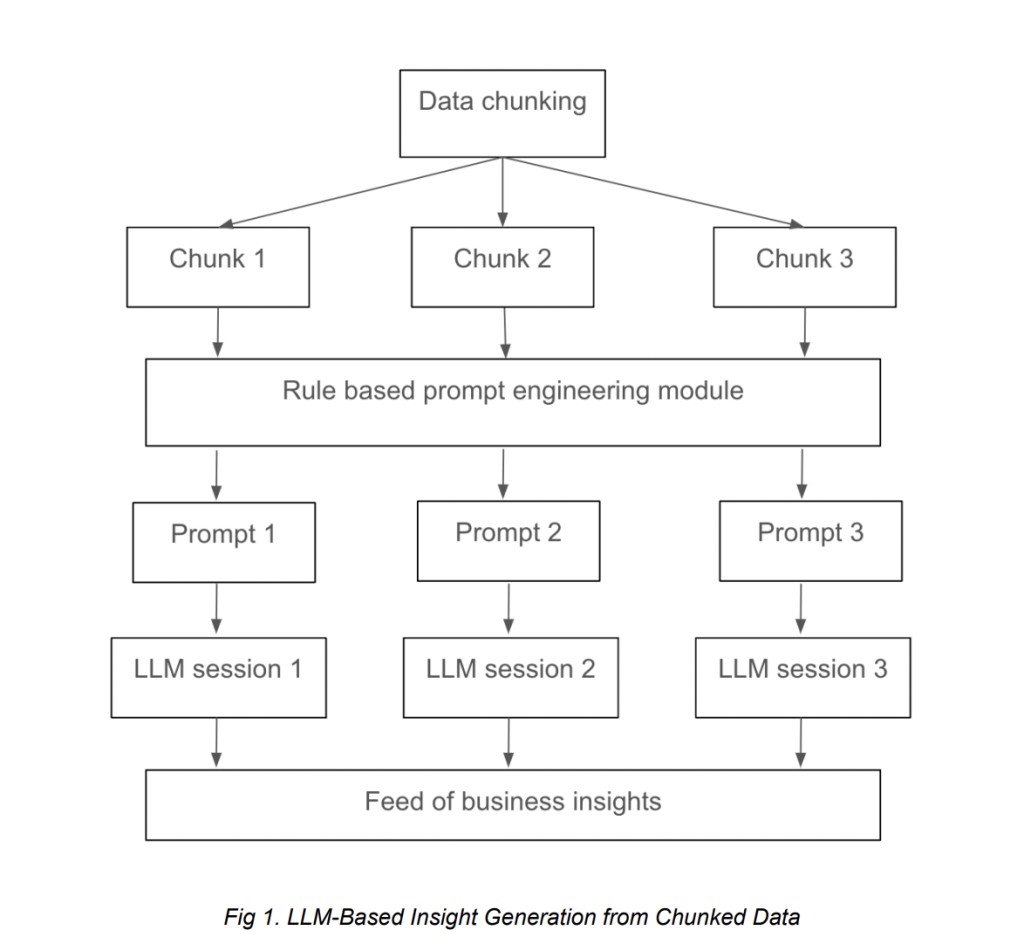Business data analysis is a field that focuses on extracting actionable insights from extensive datasets, crucial for informed decision-making and maintaining a competitive edge. Traditional rule-based systems, while precise, need help with the complexity and dynamism of modern business data. On the other hand, Artificial Intelligence (AI) models, particularly Large Language Models (LLMs), excel in recognizing patterns and making predictions but may need more precision for specific business applications. This duality necessitates innovative approaches that combine the strengths of both methodologies.
One critical challenge is generating accurate, actionable insights from vast, varied business datasets. Traditional methods often need to adapt to the dynamic nature of modern data, resulting in inefficiencies and inaccuracies. Despite their power, AI models frequently need to catch up in terms of precision required for business-specific tasks. This creates a critical need for hybrid approaches that effectively integrate rule-based systems with AI models to enhance the overall data analysis process.
Currently, business data analysis methods include rule-based systems and standalone AI models. Rule-based systems are known for their precision and reliability but face limitations when dealing with complex and dynamic data environments. AI models, especially LLMs, are adept at recognizing patterns and making predictions but often need more precision for specific business applications. Thus, exploring hybrid methods that combine these technologies is essential for achieving improved performance in data analysis.
Researchers from Narrative BI have introduced a novel hybrid approach that combines the robustness of rule-based systems with the adaptive capabilities of LLMs. This approach aims to leverage the precision of rule-based methods and the pattern recognition strengths of LLMs to generate actionable business insights from complex datasets. Integrating these two methodologies promises to address each of their shortcomings, offering a more balanced and efficient solution for business data analysis.
The proposed hybrid approach integrates interpretable AI techniques, such as Local Interpretable Model-agnostic Explanations (LIME), with rule-based systems and supervised document classification. The framework involves LLMs for natural language understanding and rule-based systems for data preprocessing and analysis. The datasets used included corporate Google Analytics 4 and Google Ads accounts data collected via APIs over two years. The process involves data cleaning, normalization, and transformation, followed by LLM-enhanced insights generation. This combination leverages the strengths of both methodologies to ensure high-quality data analysis and actionable business insights, addressing the complexities of modern business data effectively.
Performance results demonstrate the effectiveness of this hybrid approach. The hybrid model enhances transparency and trustworthiness in data extraction processes, as stakeholders can easily understand and validate the generated insights. The research also highlights the mitigation of risks associated with biases and inaccuracies inherent in LLMs. For instance, rule-based preprocessing algorithms improved processing efficiency to 100% compared to 63% for standalone LLMs, with a hybrid approach achieving 87%. Furthermore, the hybrid model significantly reduced proper name hallucinations, with errors dropping from 12% in standalone LLMs to just 3% when combining name hashing and LLM analysis.
The hybrid model’s most substantial results include improved recall of important business insights, where the hybrid approach achieved 82% processing efficiency compared to 71% for rule-based systems and 67% for standalone LLMs. Overall user satisfaction, measured by the ratio of likes to dislikes, was highest for the hybrid approach at 4.60, compared to 3.82 for LLMs and 1.79 for rule-based systems. These metrics underscore the hybrid model’s superiority in balancing precision, efficiency, and user satisfaction.
In conclusion, the hybrid model effectively addresses the challenges of traditional methods by combining the precision of rule-based systems with the flexibility of LLMs. This integration results in improved data preprocessing, insightful analysis, and actionable business intelligence, showcasing the potential of hybrid approaches in transforming business data analysis. The research conducted by Narrative BI exemplifies how leveraging the strengths of both rule-based systems and LLMs can enhance the extraction and analysis of complex business data, providing a robust framework for future innovations in business intelligence.
Check out the Paper. All credit for this research goes to the researchers of this project. Also, don’t forget to follow us on Twitter.Â
Join our Telegram Channel and LinkedIn Group.
If you like our work, you will love our newsletter..
Don’t Forget to join our 45k+ ML SubReddit
The post This AI Paper by Narrative BI Introduces a Hybrid Approach to Business Data Analysis with LLMs and Rule-Based Systems appeared first on MarkTechPost.
Source: Read MoreÂ

